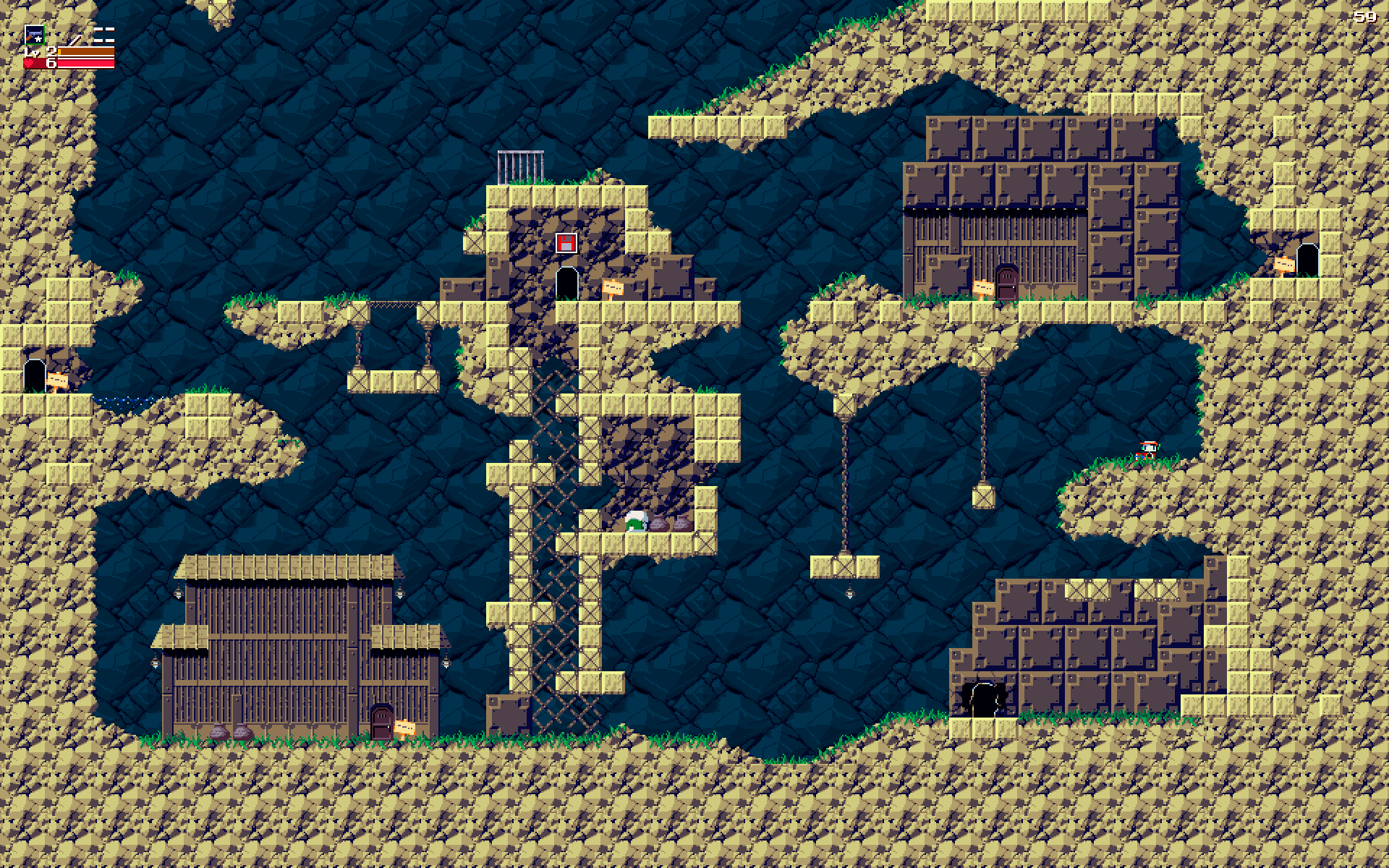Feb 10, 2019 at 8:13 PM
Join Date: Jan 13, 2016
Location:
Posts: 132
Discord server: https://discord.gg/2KamtGD
CSE2 is a decompilation of Cave Story started by Cucky, with an emphasis on accuracy to the original code. Through a combination of machine-conversion and by-hand translation, we've broken the original 2004 EXE back down to a recreation of its original C/C++ source code. As of yesterday, the game is fully completable: from First Cave to Ballos.
You can find the source code here. To compile it on Windows, you'll need Visual Studio or an MSYS2 installation with MinGW-w64.
Right now, one of the biggest deviations from the original code is the rebase from DirectX to SDL2. Personally, I plan to make a fork that moves back to DirectX, but for now SDL2 means better performance, and the ability to run CSE2 natively on Linux, so that's a bonus.
Hopefully I shouldn't have to explain how being able to work with plain C/C++ code will make advanced code modification easier. Writing a DLL chainloader to patch an EXE file is an absolute nightmare in comparison. Not to mention, this could open up the possibility of a community-maintained base for mods, with fancy things like extra TSC commands and .ogg support built right in.
As of writing, the project still isn't complete yet: the goal is to produce an EXE that's identical to the original one from Pixel himself. For now, while the game is playable from beginning to end, there may be slight differences. If you spot anything even a little off, please point it out here.
I suppose I should tell a little story here, about how this thing even got off the ground. Back when I made my DLL loader, I had to figure out how the game worked blind - I didn't even use the assembly compendium. Then GabrielRavier found out that the old Linux port contained leftover debug symbols. These symbols included the original names of practically every bit of code in the game. With this info, we could figure out just about everything we'd ever need to know about the game's code. It even gave us the names of each C/C++ file, and which functions they contained. All of this, combined with a good decompiler, meant making a decompilation was mostly just a matter of matching each bit of decompiled code with its original name.
CSE2 Portable
CSE2 Portable is a branch of CSE2 that ports the game away from DirectX/WinAPI, allowing it to run on other platforms such as Linux, while otherwise trying to preserve the original experience as much as possible. Good for purists.
Source code
Windows build
CSE2 Enhanced (discontinued)
How to compile
EDIT: Cucky told me to add a screenshot, so here's a screenshot. By changing one value in CommonDefines.h, you can make the screen not just wider, but taller:
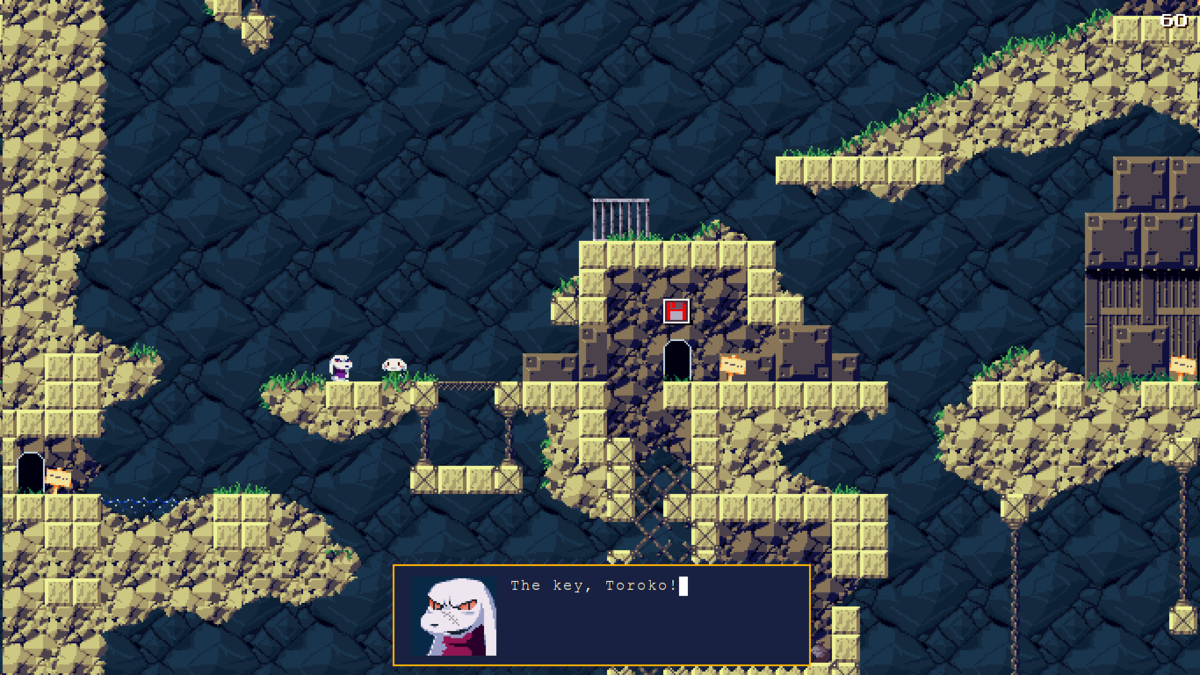
CSE2 is a decompilation of Cave Story started by Cucky, with an emphasis on accuracy to the original code. Through a combination of machine-conversion and by-hand translation, we've broken the original 2004 EXE back down to a recreation of its original C/C++ source code. As of yesterday, the game is fully completable: from First Cave to Ballos.
You can find the source code here. To compile it on Windows, you'll need Visual Studio or an MSYS2 installation with MinGW-w64.
Hopefully I shouldn't have to explain how being able to work with plain C/C++ code will make advanced code modification easier. Writing a DLL chainloader to patch an EXE file is an absolute nightmare in comparison. Not to mention, this could open up the possibility of a community-maintained base for mods, with fancy things like extra TSC commands and .ogg support built right in.
As of writing, the project still isn't complete yet: the goal is to produce an EXE that's identical to the original one from Pixel himself. For now, while the game is playable from beginning to end, there may be slight differences. If you spot anything even a little off, please point it out here.
I suppose I should tell a little story here, about how this thing even got off the ground. Back when I made my DLL loader, I had to figure out how the game worked blind - I didn't even use the assembly compendium. Then GabrielRavier found out that the old Linux port contained leftover debug symbols. These symbols included the original names of practically every bit of code in the game. With this info, we could figure out just about everything we'd ever need to know about the game's code. It even gave us the names of each C/C++ file, and which functions they contained. All of this, combined with a good decompiler, meant making a decompilation was mostly just a matter of matching each bit of decompiled code with its original name.
CSE2 Portable
CSE2 Portable is a branch of CSE2 that ports the game away from DirectX/WinAPI, allowing it to run on other platforms such as Linux, while otherwise trying to preserve the original experience as much as possible. Good for purists.
Source code
Windows build
CSE2 Enhanced (discontinued)
CSE2E is a modified version of CSE2 with extra features:
Also included are enhancements specifically for modders:
Source code
Windows build
- Widescreen
- Support for alternate soundtracks
- Options menu
- Control remapping (keyboard and gamepad)
- Soundtrack selection
- V-sync toggle
- 50FPS/60FPS toggle
- Option to disable the sprites locking to a 320x240 grid when drawn, making them move smoother
- Bugfixes
Also included are enhancements specifically for modders:
- PNG support
- Full alpha blending support
- Fixed text blending, utilising the aforementioned alpha support
- All resource files moved to the data folder
- Booster's Lab support (open 'data/mrmap.bin')
- PixTone sounds split to .pxt files
- Support for Ogg Vorbis, FLAC, .it, .xm, .mod, .s3m, and PxTone audio formats for music and SFX
- Support for high-resolution sprites (see SPRITE_SCALE in CommonDefines.h)
- Extra TSC commands
- <MS4
- <MIM
- <PHY
- No TSC script size limit (the vanilla limit is around 0x5000 bytes)
Source code
Windows build
How to compile
So you want to compile CSE2?
Well, to start, you'll need Visual Studio. I know a lot of people recommend MSYS2 instead, and while it is a lot more lightweight, it's also way more complex, and outright broken in some places, which will make compiling an absolute nightmare (I'm looking at you, Brotli).
So, we'll be using Visual Studio Community 2019. Don't worry - it's free. You can download it here:

 visualstudio.microsoft.com
visualstudio.microsoft.com
Once it's downloaded, run `vs_Community.exe`. Follow the installer until you reach this menu:
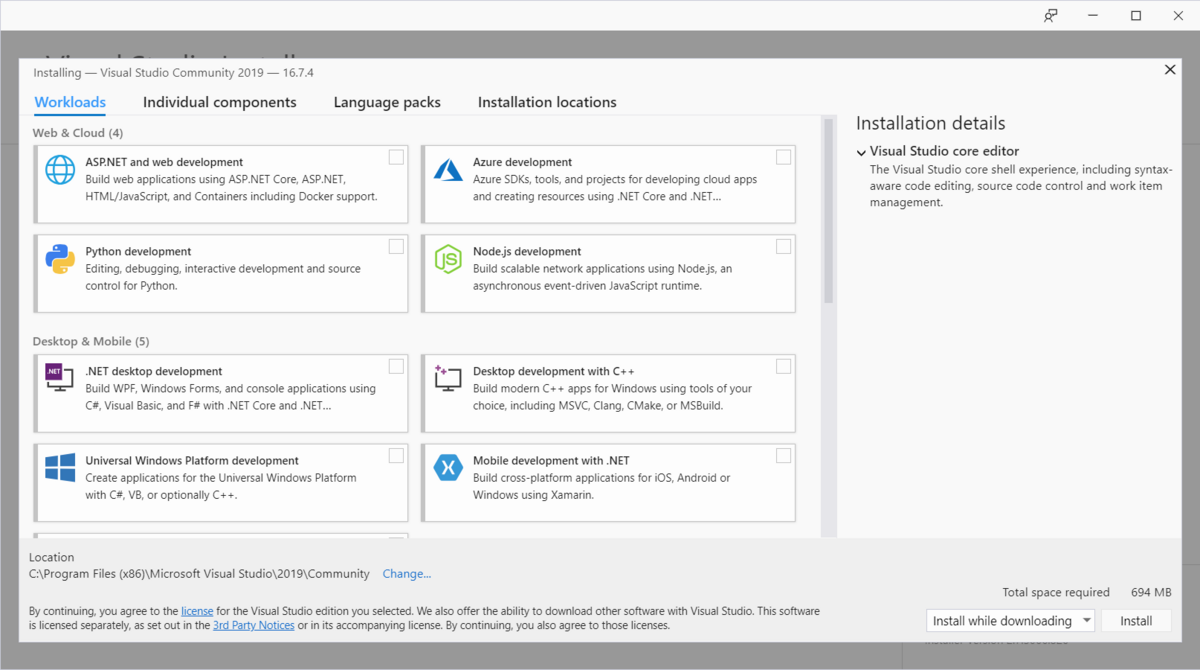
Here, you'll want to select the 'Desktop development with C++' workload, and then click 'Install'. Once it's done installing, you'll be prompted to restart your computer.
Next, download a copy of CSE2's source code if you haven't already and extract it somewhere. You can find a copy of CSE2 Portable's code here:
You are now ready to compile CSE2. To begin, open Visual Studio 2019. If it prompts you to open a project, select 'Continue without code' to skip past it and enter the main IDE. It should look something like this:
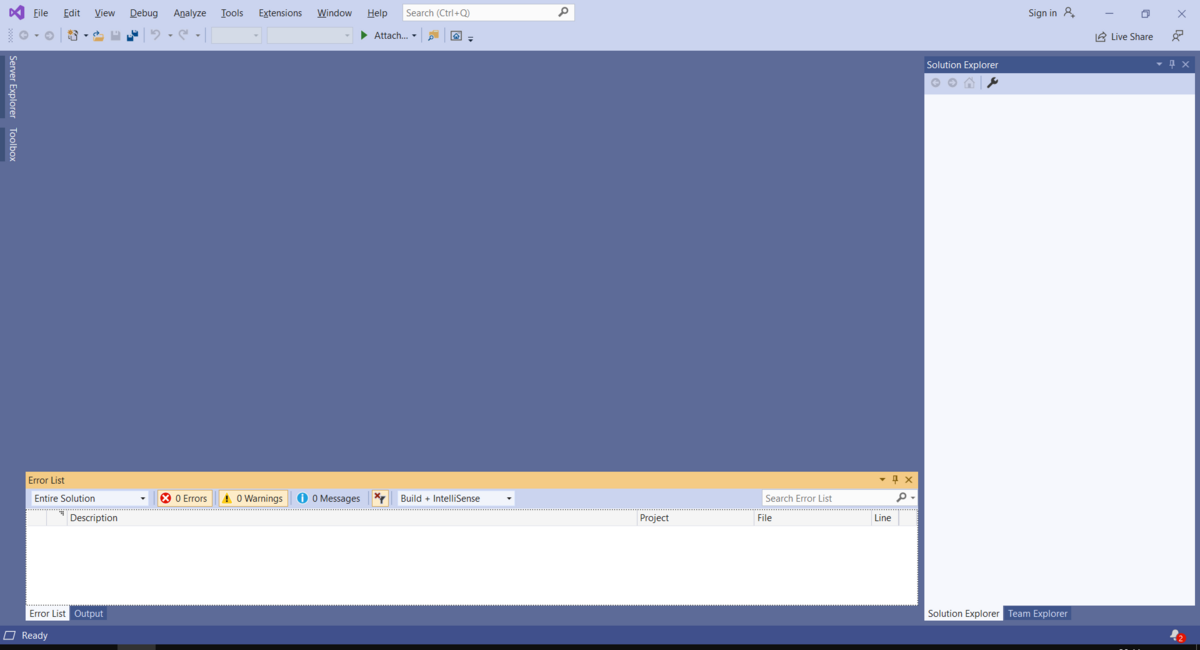
From here, select `File/Open/CMake`, and then navigate to where you extracted the CSE2 source code, and open the `CMakeLists.txt` file.
After this, Visual Studio will spend a few minutes configuring itself. You can see all of this in the little text console at the bottom of the window. Eventually, it will conclude, and hopefully not report any errors. The window should now look something like this:
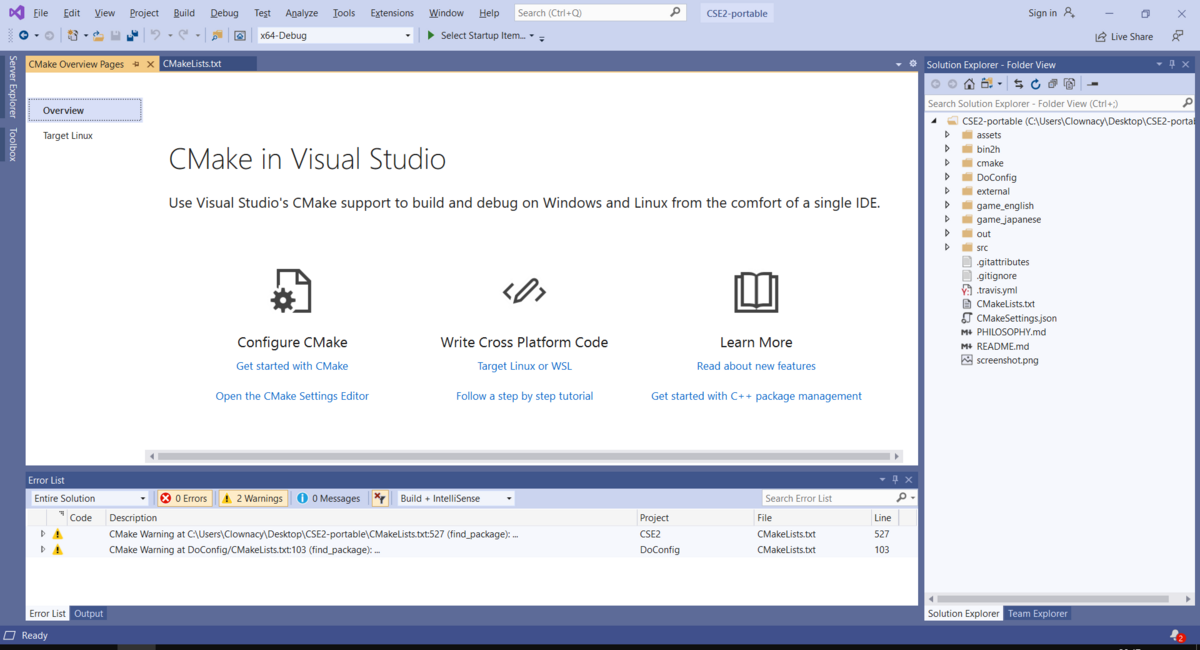
You are now able to produce 64-bit Debug builds of CSE2. To do so, simply select `Build/Build All`. Like before, Visual Studio will spend the next few minutes performing tasks, and reporting back in the text console. It should eventually generate `CSE2_debug.exe` and `DoConfig_debug.exe`, which you can find in CSE2's `game_english` folder.
However, you probably want to be compiling Release builds, not Debug builds. To do so, select the 'Open the CMake Settings Editor' option. It will take you to this menu:
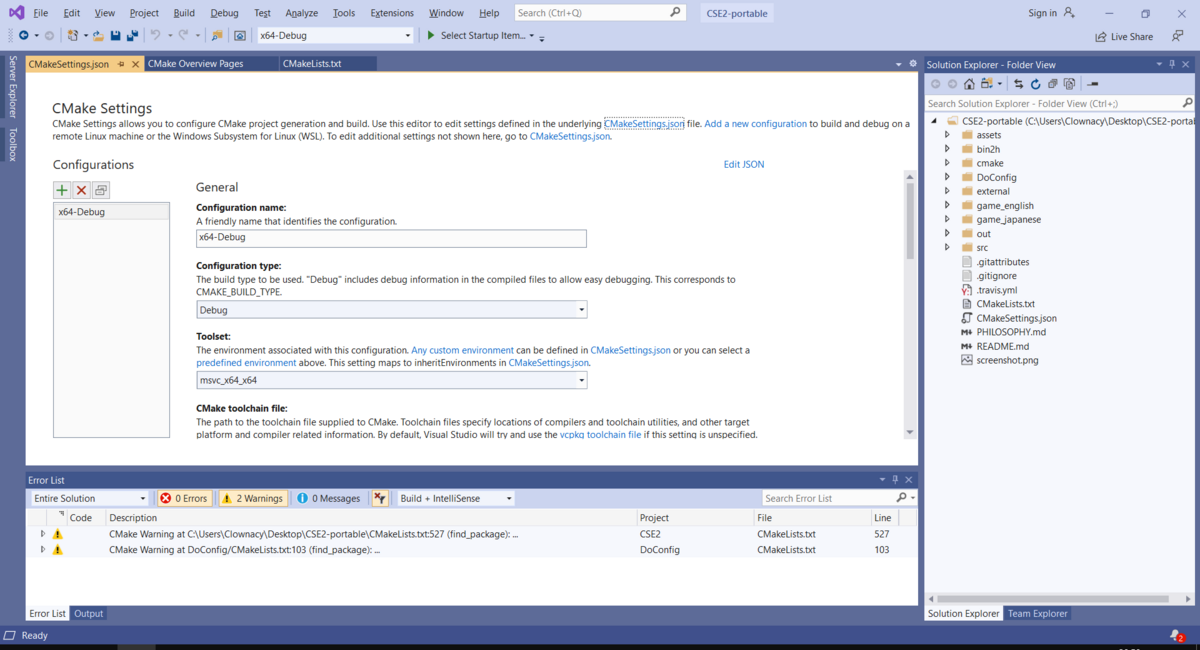
From here, change the 'Configuration type' option to 'Release'. You can now rebuild CSE2, and the files `CSE2.exe` and `DoConfig.exe` will be generated in the `game_english` folder.
And... that's it. If you want, you can edit CSE2's code by expanding the `src` folder on the right, and selecting one of the various `.cpp` files.
Well, to start, you'll need Visual Studio. I know a lot of people recommend MSYS2 instead, and while it is a lot more lightweight, it's also way more complex, and outright broken in some places, which will make compiling an absolute nightmare (I'm looking at you, Brotli).
So, we'll be using Visual Studio Community 2019. Don't worry - it's free. You can download it here:

Visual Studio: IDE and Code Editor for Software Developers and Teams
Visual Studio dev tools & services make app development easy for any developer, on any platform & language. Develop with our code editor or IDE anywhere for free.
 visualstudio.microsoft.com
visualstudio.microsoft.com
Once it's downloaded, run `vs_Community.exe`. Follow the installer until you reach this menu:

Here, you'll want to select the 'Desktop development with C++' workload, and then click 'Install'. Once it's done installing, you'll be prompted to restart your computer.
Next, download a copy of CSE2's source code if you haven't already and extract it somewhere. You can find a copy of CSE2 Portable's code here:
You are now ready to compile CSE2. To begin, open Visual Studio 2019. If it prompts you to open a project, select 'Continue without code' to skip past it and enter the main IDE. It should look something like this:

From here, select `File/Open/CMake`, and then navigate to where you extracted the CSE2 source code, and open the `CMakeLists.txt` file.
After this, Visual Studio will spend a few minutes configuring itself. You can see all of this in the little text console at the bottom of the window. Eventually, it will conclude, and hopefully not report any errors. The window should now look something like this:

You are now able to produce 64-bit Debug builds of CSE2. To do so, simply select `Build/Build All`. Like before, Visual Studio will spend the next few minutes performing tasks, and reporting back in the text console. It should eventually generate `CSE2_debug.exe` and `DoConfig_debug.exe`, which you can find in CSE2's `game_english` folder.
However, you probably want to be compiling Release builds, not Debug builds. To do so, select the 'Open the CMake Settings Editor' option. It will take you to this menu:

From here, change the 'Configuration type' option to 'Release'. You can now rebuild CSE2, and the files `CSE2.exe` and `DoConfig.exe` will be generated in the `game_english` folder.
And... that's it. If you want, you can edit CSE2's code by expanding the `src` folder on the right, and selecting one of the various `.cpp` files.
EDIT: Cucky told me to add a screenshot, so here's a screenshot. By changing one value in CommonDefines.h, you can make the screen not just wider, but taller:

Last edited:








